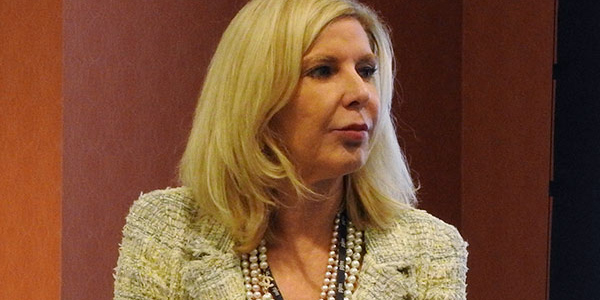By Christen Smith
Transmission owners warned PJM last month that FERC inaction on the RTO’s capacity market revamp isn’t the only obstacle stalling future capacity auctions — state legislatures will likely need extra time to comply with the ruling too.
In a Sept. 4 letter addressed to the PJM Board of Managers, CEOs from PJM’s largest utilities urged the RTO to convene a meeting with stakeholders and produce a schedule that allows for time between FERC’s decision and the 2022/23 and 2023/24 Base Residual Auctions.
“Regardless of what FERC decides as to these new market rules, states will need time to react by redesigning their own clean energy programs and utility procurement programs,” said the CEOs of American Electric Power, Exelon, Public Service Enterprise Group, Dominion Energy and FirstEnergy. “This is no easy task.”

Interim PJM CEO Susan Riley | © RTO Insider
PJM submitted its proposal to create a resource-specific fixed resource requirement (FRR) in October 2018, four months after FERC ruled that its capacity market rules were not just and reasonable because they failed to address growing subsidies that the commission said are suppressing prices. (See FERC Orders PJM Capacity Market Revamp.)
The RTO made the FRR proposal as an alternative to expanding its minimum offer price rule (MOPR) to include all new and existing capacity receiving out-of-market payments, such as renewable energy credits and zero-emission credits for nuclear plants. The RTO’s MOPR currently covers only new gas-fired units.
The TOs cited comments filed with FERC from all sectors — including states, consumer advocates, load interests, suppliers, nongovernmental organizations and public power groups — that said regulatory and legislative changes will likely be required in the majority of PJM’s footprint to accommodate an FRR or expanded MOPR. Moving forward without these controls in place would further destabilize price signals and result in stranded costs, the TOs said.
“When the capacity auctions … are ultimately held, they will be most successful if they occur against a backdrop of stable and settled market rules, as well as state policies enacted in response to those rules,” the TOs’ letter concludes. “Indeed, it would be counterproductive to hold an auction when major portions of the auction framework remain in flux.”
On Sept. 27, a second cross-section of PJM members — including AEP Service Corp., Avangrid Renewables, the Illinois Citizens Utility Board, the Delaware Division of the Public Advocate, Dominion, EDP Renewables, Exelon, FirstEnergy Utilities, Natural Resources Defense Council, Nuclear Energy Institute, the D.C. Office of the People’s Counsel, PSEG and the Sierra Club — requested the RTO produce a capacity auction schedule that accommodates state and regulatory timelines, reiterating that any auction held next year would likely still be too early to factor in the impact of these policy changes.
“A rushed auction process would lead to skewed price signals that undermine economically rational behavior while reinforcing the high level of perceived (if not real) conflict that currently exists between PJM and the states,” the letter concluded.
PJM indefinitely suspended all deadlines for its upcoming BRAs pending FERC action before the end of year, when many deadlines for the 2023/24 auction would come due. (See FERC Halts PJM Capacity Auction.)
In a response to the TOs dated Sept. 12, PJM agreed to consult with stakeholders and reach out to state and regulatory commissions after a FERC order to consider next steps. Interim CEO Susan Riley noted that a “prolonged delay” undermines both investment decisions and capacity and reserve requirements.
Stakeholders, notably, say neither factor is of great concern — considering PJM’s healthy reserve margins and the fact that developers work on their own timelines — and don’t require the RTO to rush BRAs.
“At the same time, we agree that the auction must be both practical in its implementation and offer a meaningful opportunity for states to consider and pursue alternatives depending on the substance of the FERC order and their policy objectives,” Riley said. “This question of timing is well-briefed and clearly before FERC such that it may be addressed in its decision.”
PJM spokesperson Susan Buehler said Wednesday that Riley’s response applies to both stakeholder letters.
On Friday, the PJM Industrial Customer Coalition and the PJM Power Providers Group submitted a joint letter to the board pushing back against claims from other sectors that an extended delay is sustainable, saying that many resources’ lending arrangements are based on three-year forward capacity commitments and payments.
“While recipients of out-of-market payments or those resources seeking to exit the market through a FERC-sanctioned carve out may be able to better manage a capacity auction delay, those resources solely dependent on market revenues to determine their viability rely heavily on the three-year forward capacity construct to make decisions related to investments in existing units, construction of new units or retirement of uneconomic units,” the groups wrote. “The current delay of the 2019 auction is challenging many of these financial arrangements that are so critical to the overall vitality of PJM’s markets.”



